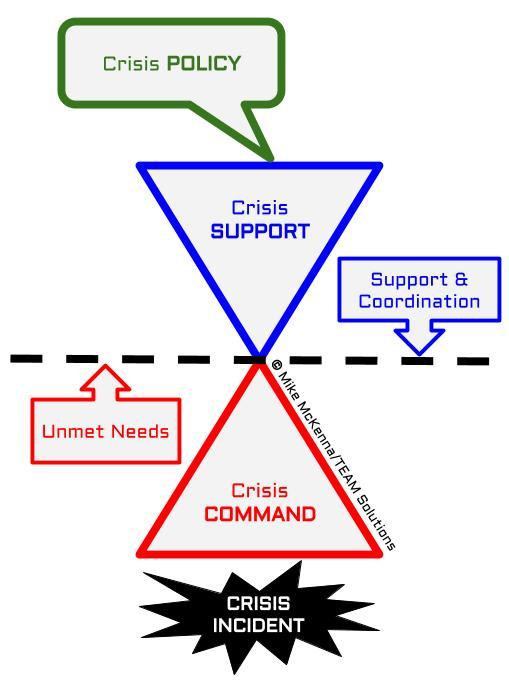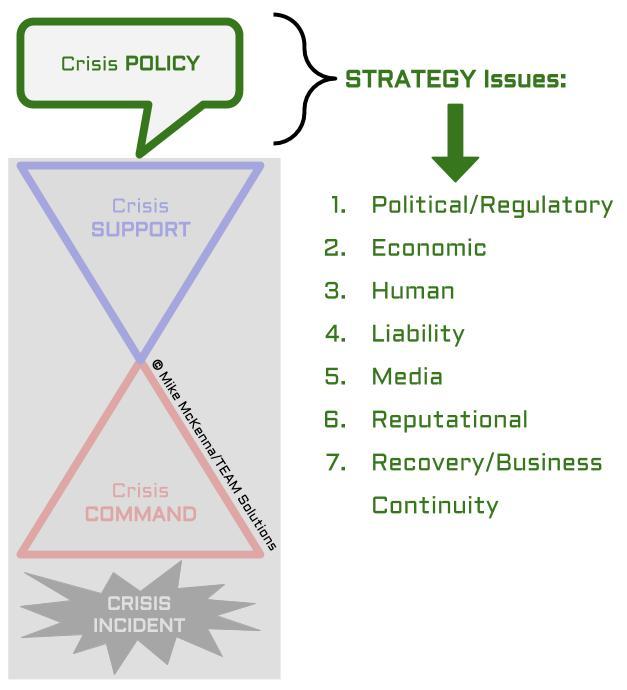Johnny Dangerous ... cool name.
Cool Hand Luke ... cool name.
Henry Herpes ... not so cool name (especially if your real name is Henry).
Names can matter. If you're ever going to be in the business of naming a crisis, this article is for you.

5 quick Case Studies and then a solution. Let's begin.
The Weather Channel
In 2011, if you turned on the telly to check the weather, winter storms were called, well, winter storms.
Since 2012, however, winter storms were given ... personality.
The Weather Channel (a for-profit business) started giving names to storms they report on, like Jonas, Biff, and Cyrus.
They did and continue to do so without input from The National Weather Service (the federal government's official weather monitoring agency) or other bona fide weather monitoring services. More marketing than real weather science if you ask me, but relevant for the point of this article nonetheless.
If you tune into The Weather Channel you can exclusively track and monitor storms by their given name instead of by their size or scope.
Even though the rest of the weather world still calls winter storms by just their birth name: "winter storms."
In defense of their approach: "It's simply easier to communicate about a complex storm if it has a name," says TWC hurricane specialist Bryan Norcross.
Fair point.
- When communicating about something complex ... simple matters.
The FBI
Back in my product anti-counterfeiting days, I served as an investigative 'liaison' between my corporate clients whose products were being counterfeited and the law enforcement agency who had the gun-and-badge remedy to stop them.
Occasionally, our cases were large enough where federal enforcement was the most useful deterrent.
Enter the Federal Bureau of Investigation.
The procedure was for me to share my case file emblazoned with my official-sounding case number (i.e. 2015-11-Seong.J-6a) plus all of our evidence and investigative findings for them to evaluate. They would then cloister themselves back at their head-shed to do 'FBI stuff' while we waited on whether they would work with us.
I eventually discovered that at least some of the FBI stuff consisted of a series of meetings to give the newly approved project a cool sounding name.
- Operation Clone Star State ...
- Operation Texas Two Step ...
- Operation Takedown, etc. ...
Their reasoning served many purposes, including the made-for-TV name that made the FBI look good when the project was discussed on the evening news.
- When public support matters ... speaking to them on on their terms matters.
Coronavirus
In 2019 the world starting to wrestle with what was known publicly as COVID-19, caused by an outbreak of the coronavirus.
COronaVIrus Disease 2019 is how COVID-19 got its name.
When the outbreak was first detected in Wuhan, China, global health officials took a few weeks to - among other things - give the virus a proper name.
- Do you know what global health officials want you to call the source of the outbreak? COVID19.
- Do you know what global health officials don't want you to call the course of the outbreak? Anything that brings unwelcome attention to an actual place, person or that can't be pronounced easily.
“We had to find a name that did not refer to a geographical location, an animal, an individual, or a group of people, and which is also pronounceable and related to the disease,” said Tedros Adhanom Ghebreyesus, the director-general of the WHO (World Health Organization).
Naming a life-threatening disease can create many unintended consequences. Just ask anyone who may be considering naming their child Lou Gehrig.
- When needing to avoid political conflict or geographic sensitivities ... names matter.
Station Fire(s)
In 2003 at the Station nightclub in West Warwick, Rhode Island, 100 people were killed and 230 people were injured when pyrotechnics ignited the walls and ceiling during a Great White music concert. The cascade of bad choices (including blocking the fire escapes) led to multiple people incarcerated and over $115 million dollars paid out in settlements.
- Ask most insurance agents, lawyers, music fans, or Google about the "Rhode Island nightclub tragedy" in the early 2000s and they'll know it as the Station nightclub Fire.
If you were connected to the 'Station' brand name, you were also forever linked to that tragedy. The list of tragedies that we link to the organization where it happened is vast. And their business - if they survive - will never be the same: Pulse Nightclub in Orlando, World Trade Center in New York, etc.
You'll note that the relative size of the impact compared to the size of the organization factors in heavily. For instance, an active shooter at an El Paso Walmart in 2019 doesn't likely influence people's view of Walmart as a whole, whose size and scope include nearly 12,000 stores.
Speaking of size and scope ...
In 2009, an arsonist started a wildfire that burned over 150,000 acres in Los Angeles County California. Two firefighters were killed and more than 200 buildings were destroyed.
The wildfire burned for nearly 2 months and costs exceeded a staggering $93 million dollars.
- Ask most insurance agents, lawyers, firefighters, California residents, or Google about the "Station wildfire" in the late 2000s and they'll know it as the Station wildfire.
Except in this "station" example, the station refers to the US Forest Service Angeles Crest Fire Station, located about a mile away from the fire's origin.
Clever crisis leaders in the wildland fire service long ago decided to choose innate geographical features to name their wildfires instead of businesses.
If something is going to be seared into the public's brains, the logic goes, it shouldn't be something that leaves a negative memory of an organization trying to recover their reputation or reduce their legal exposure.
Remember, recovery starts at the beginning of an incident, not at the end. Therefore ...
- When a community's recovery is at stake ... names matter.
1 October Mass Casualty Shooting
- February 14th
- July 4th
- September 11th
- December 7th
- December 25th
For better or worse those dates likely all mean something to each of you. Some conjure positive memories and some not so much.
Regardless, any emotional response is first triggered by the date - not about the person, place or thing that fills out the rest of your memories of that date.
What about October 1, 2017?
That's the day when the deadliest mass shooting in US history occurred in Las Vegas, Nevada.
If you don't remember the hotel where the shooter was, or the name of the venue where 58 people were killed and 413 were wounded, well, that's intentional.
- The Mandalay Bay Hotel and Casino doesn't want their name associated with the incident to prevent future customers from associating their name with such a horrid attack.
- The Route 91 Harvest Music Festival doesn't want their name associated with the incident to prevent future customers from associating their name with such a horrid attack.
Horrid attacks and business resilience don't go very well together.
That's why the official AAR (After Action Report) of the attack published by the Las Vegas Metropolitan Police Department (LVMPD), is called:
LVMPD Criminal Investigative Report
of the
1 October Mass Casualty Shooting
LVMPD Event Number 171001-3519
We will all likely remember the attack, the images, the city, etc. What the crisis leaders hope we don't remember are the names of the businesses that were caught in the crossfire.
- When business resilience and legal exposure is at risk ... names matters.
Tragedies and incidents like those mentioned above are seared into our limbic system, so it's important that forethought is also given to what and how the crisis is named.
- If a crisis impacts your organization publicly, how do you want it to be remembered?
- From the perspective of your stakeholders (sponsors, the business community, chamber of commerce, political leaders, promoters/marketers, etc.), how do they want it to be remembered?
If you're considering this topic from the perspective of a boots-on-the-ground crisis responder, I'd agree with you that the name of an event or incident is hardly a top concern.
However as a crisis leader, it's imperative to address things like reputation, liability, recovery, etc. even if you are not the one addressing it.
Keep reading for a useful solution.
SOLUTIONS: Who, Where, and How?
Let's use a simplified view of a crisis incident and then I'll break it down, below.

Starting from the bottom, you'll see the following components:
Crisis Incident - The reason we're even talking about this. Could also be a planned event.
Crisis Command - In ICS (Incident Command System) terms, this is the Incident Command Post, or ICP. They are responsible for managing the crisis and communicating any unmet needs to Crisis Support.
- Crisis Command's focus is TACTICAL
Crisis Support - In ICS (Incident Command System) terms, this is the Emergency Operations Center, or EOC. They are responsible for supporting and coordinating any unmet needs requested from Crisis Command.
- Crisis Support's focus is COORDINATION
Crisis Policy - In ICS (Incident Command System) terms, this is the Multi-Agency Coordination System, or MACS. In the private sector, this policy group is typically occupied by an executive team and other high-level stakeholders.
- Crisis Policy's focus is STRATEGIC
To be a contributing member of an executive policy group, authority over two key functions is needed:
- Authority to allocate resources (money, people, and things)
- Authority to create or change policy
And because each level is further away from the incident than the last, the insights and contributions to addressing the incident must change the higher in the organization we serve.
It's also useful to remember that the closer you are to a problem, the better solution you'll likely have to solve that problem.
By keeping crisis problem-solving at the level where it will be implemented, those serving in the higher levels are freed up to focus on coordination-related and strategy-related issues.
For those serving at the policy level, there are 7 common and critical issues that need their policy level attention.
The 7 Common & Critical Policy-level Issues:

- Political & Regulatory issues - (Unified or separate effort? Agendas? Multi-jurisdiction w/ different priorities?)
- Economic issues - What are the expected costs of incident operations? What about recovery costs? Do we have budget limits? Will this incident cause us to lose out on future events?
- Human issues - Stress debriefing for incident responders? Demonstration of empathy? What is the impact of the community's long -term psychological status/memory? Do we need a Reunification Center?
- Liabilities issues - Are there legal limits to our financial exposure? Are there contracts, insurance, or other mitigation in place?
- Media issues - Is there positive/negative reporting? Is social media a factor? How will address differing views? Are we supporting messaging for both internal and external stakeholders?
- Reputational issues - Have we lost trust or damaged our brand Image? Did we do a good/bad job? What are short, medium and long-term impacts to our reputation?
- Recovery & Business Continuity issues - How quick/effectively can we recover? Is anyone sharing the costs or reimbursing us? Is the decision-making process inclusive of all impacted stakeholders? How short/intermediate/long will the recovery be?
And since those at the tactical level are focusing on extinguishing fires and saving lives ... if the policy folks don't address those 7 critical issues, they likely won't be addressed at all.
- Looking back to the example of the Station nightclub fire ... if a crisis policy group was activated to address strategic issues like reputation, liability, etc. would history know that crisis incident by another name?
And no, not every incident and not every organization requires the activation of a crisis policy group. However, the strategic function they perform is almost always necessary to ensure that some is looking around the corner for unexpected consequences.
Giving your planned or unplanned event a proper name can be an effective place to start.
I'm an email away if you and your organization need more guidance or assistance. Reach out to me below.
